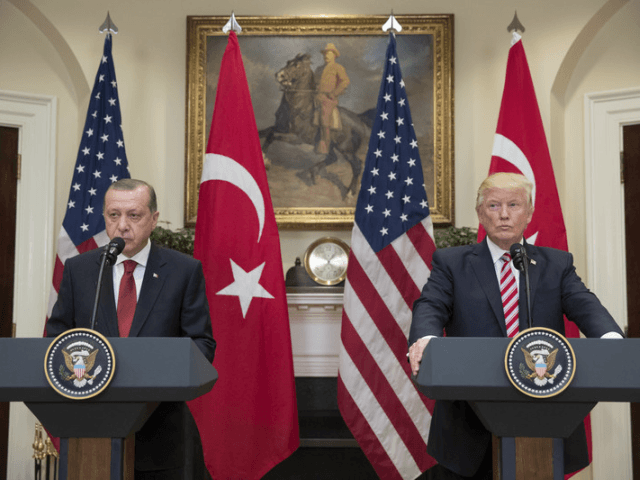Turkey has frozen non-immigrant visa services for U.S. citizens, mirroring a U.S. announcement of the same policy Sunday in response to the arrest this week of a U.S. consulate worker in Istanbul for alleged ties to Islamic cleric Fethullah Gulen.
The government of Turkey’s Islamist President Recep Tayyip Erdogan blames Gulen, a resident of Pennsylvania, for a failed coup against Erdogan in July 2016. Gulen—the head of an international charter school network known as “Hizmet” but referred to by Ankara as the “Fethullah Terrorist Organization (FETO)”—denies any involvement in the incident.
Turkish officials arrested Metin Topuz, a worker at the U.S. consulate in Istanbul, under terrorism-related charges last week. Turkey’s state-run Anadolu Agency claims Topuz is “linked to the Fethullah Terrorist Organization (FETO), the group behind last year’s defeated coup in Turkey.”
Following the arrest, the U.S. Embassy in Ankara announced Sunday that it would no longer issue non-immigrant visas. “Recent events have forced the United States Government to reassess the commitment of the Government of Turkey to the security of U.S. Mission facilities and personnel,” a statement from the embassy said. “In order to minimize the number of visitors to our Embassy and Consulates while this assessment proceeds, effective immediately we have suspended all non-immigrant visa services at all U.S. diplomatic facilities in Turkey.”
Hours later, a nearly identical statement appeared on the Turkish Embassy in Washington’s website. “Recent events have forced Turkish Government to reassess the commitment of the Government of the United States to the security of Turkish Mission facilities and personnel,” that statement read. “In order to minimize the number of visitors to our Embassy and Consulates while this assessment proceeds, effective immediately we have suspended all non-immigrant visa service at all Turkish diplomatic facilities in the U.S.”
CNN notes that the parallel policy “effectively blocks Turks from travel to the United States, and vice versa, indefinitely.” CNN notes that attempts to apply for a visa to Turkey online trigger a message reading “unfortunately, nationals of the country that you selected are not eligible for e-Visa.”
In addition to blocking Americans from Turkey, Turkish newspaper Hurriyet notes that Ankara summoned the Deputy Chief of Mission of the U.S. Embassy in Ankara to protest the ban on Turks visiting the United States. Hurriyet reports that officials demanded “immediate relief” of the new policy. Anadolu Agency adds that the Foreign Ministry also summoned Charge d’Affaires Philip Kosnett “to hear the case against the U.S. decision to suspend processing non-immigrant visa applications.”
While meeting with the Deputy Chief of Mission, one Turkish official—Justice Minister Abdülhamit Gül—refused to meet with the ambassador himself, John Bass. Bass is not currently in Ankara, hence the summoning of Kosnett instead.
The Turkish government insists that it had probable cause to arrest Topuz because the worker reportedly “has been linked to a number of FETO suspects, including police commissioners and former prosecutor Zekeriya Oz, a fugitive accused of attempting to overthrow the government through the use of force,” according to Anadolu. Hurriyet adds that there appears to be a second Istanbul consulate worker under criminal suspicion, invited “to testify as a suspect” to the prosecutor’s office.
Yeni Safak, an excitable pro-Erdogan publication that routinely accuses the United States of terrorism, claims police have issued a second arrest warrant, but the unnamed suspect “refuses to leave the consulate building.” Yeni Safak also details the accusations against Topuz, claiming he is specifically facing charges of “attempting to disrupt constitutional order, espionage and attempting to eradicate the Turkish government.” The newspaper links Topuz to police officers arrested for ties to Gulen, a “prominent al-Qaeda member,” and high-ranking coup plotters.
If the charges against Topuz are false, it would not be the first time that Ankara is accused of fabricating Gulenist conspiracies to pressure the United States into extraditing the cleric. Turkey is currently imprisoning an American citizen, U.S. pastor Andrew Brunson, on charges of conspiring with both Gulenists and Kurdish separatists. Turkish officials have not reconciled the charges of working with an imam to establish an Islamic state in Turkey with the fact that Brunson is a devoted Christian pastor, and Erdogan himself has all but called Brunson a hostage, suggesting he arrested Brunson to use as a bargaining chip for Gulen.
“We have given you all the documents necessary [for the extradition of Gülen]. But they say, ‘give us the pastor.’ You have another pastor in your hands. Give us that pastor and we will do what we can in the judiciary to give you this one,” Erdoğan said in September.

COMMENTS
Please let us know if you're having issues with commenting.